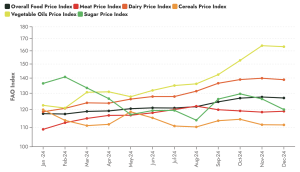Raising food prices in 2025
The cost of food is expected to rise in the latter half of the year due to a combination of climate change, supply chain pressures and geopolitical conflicts. According to the latest British Retail Consortium (BRC) model, food prices are forecasted to increase by an average of 4.2%. The BRC group warns that there is ‘little hope’ of food prices ‘going anywhere but up.’ This contrasts with the IGD forecast, which predicts price increases between 2.4% and 4.9%, with a mid-point of 3.4%.
Global Food Price Index (monthly)
The Food Foundation’s most recent data highlights approximately 7.2 million adults in the UK are experiencing food insecurity, equating to 13.6% of the population. The price increases will impact the most vulnerable communities the hardest. Since 2022, when international food prices peaked at 19% increase due to covid, they have been steadily falling. However, in 2024, the FAO Food Price Index suggests that global food prices have started to climb again.

It is also important to note that over 1.2 million food sector workers are earning below the real living wage, making them approximately three times more likely to be underpaid compared to workers in other industries. This financial strain adds to the challenges already faced by low-income households in affording basic necessities.
Ongoing conflicts in the Middle East and strike action in the US are amplifying global supply chain issues. Shipping delays and increased costs are making it harder and more expensive for companies to transport food supplies. These disruptions further contribute to rising prices and potential shortages.
Alongside geopolitical factors, the climate crisis continues to have a massive impact on global food security, Extreme weather events, including floods, wildfires, and prolonged droughts, have severely impacted agriculture production in key food-producing regions like Spain, parts of Africa, and the United States. The UK has also experienced extreme weather conditions with Storm Bert and Storm Darragh causing agricultural disruptions.
If global temperatures exceed 2°C above pre-industrial levels, the consequences for food security will be potentially irreversible. Without action, climate change will continue to affect people and the planet.
Learn more about the effects climate change has on food security here.
It is prevalent that food security will remain a pressing issue as 2025 continues. Having access to healthy and affordable food should not be a privilege and we all need to work together to address the food cause of rising food prices.
Further reading and sources:
Commodities outlook: what threats lie ahead in 2025?
Retailers warn of higher prices in 2025 and urge ministers to ease tax burden
M&S Christmas cheer hit by uncertain outlook for UK
Global supply chains are under pressure again. Will inflation start rising?
Food prices tracker: January 2025

